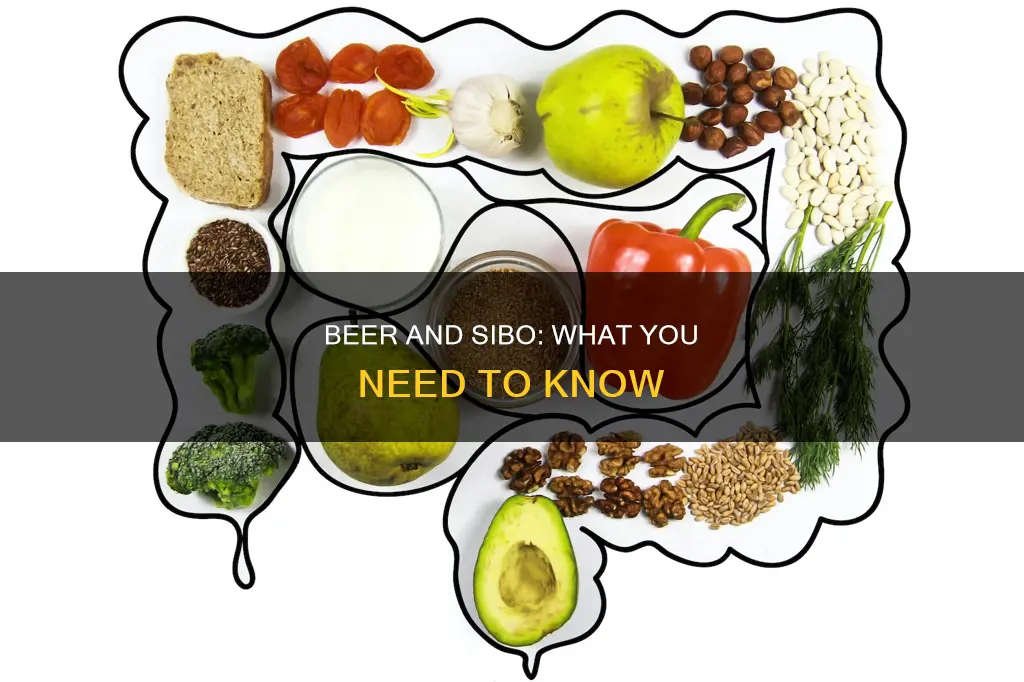
If you have been diagnosed with small intestinal bacterial overgrowth (SIBO), you may be wondering if it is safe to consume alcohol. SIBO is a condition characterised by excessive bacterial growth in the small intestine, which can lead to uncomfortable symptoms and digestive issues. Alcohol consumption can disrupt the balance of gut bacteria and impair gut motility, potentially triggering an immune response and worsening SIBO symptoms.
While alcohol can negatively impact gut health, individuals with SIBO may still be able to indulge in an occasional drink in moderation. However, it is important to choose your alcohol and mixers carefully. Beer, for example, contains carbohydrates that can fuel bacterial overgrowth, and its carbonation can contribute to bloating and discomfort. Opting for light or gluten-free beers may be a better choice. Wine, particularly dry wines with lower sugar content, can be enjoyed in moderation, but some individuals with SIBO may be sensitive to histamines and sulfites found in wine. Spirits like vodka, gin, and tequila are generally lower in carbohydrates but should be consumed without high-sugar mixers.
Overall, while it is possible to enjoy an occasional alcoholic beverage with SIBO, it is important to be mindful of your choices and consumption, as alcohol can exacerbate symptoms and negatively impact gut health.
| Characteristics | Values |
|---|---|
| Alcohol and SIBO | Alcohol can irritate and inflame the gastrointestinal tract, damaging the lining of the stomach and intestines. This can lead to an increased risk of SIBO and contribute to existing SIBO symptoms. |
| Alcohol's impact on gut bacteria | Alcohol can disrupt the balance of gut bacteria, leading to an overgrowth of harmful bacteria and a decrease in beneficial bacteria. |
| Alcohol and the migrating motor complex (MMC) | Alcohol impairs the MMC's ability to sweep bacteria and debris out of the small intestine, allowing bacteria to accumulate and potentially leading to SIBO. |
| Alcohol and the immune system | Excessive alcohol consumption can weaken the immune system, compromising its ability to control bacterial overgrowth in the gut. |
| Beer and SIBO | Beer contains carbohydrates that can serve as a food source for bacteria in the small intestine, fuelling bacterial overgrowth and worsening SIBO symptoms. |
| Wine and SIBO | Wine contains alcohol, which can irritate the GI tract and impact gut health. Sweet dessert wines may have a higher sugar content, further exacerbating SIBO symptoms. |
| Hard liquor and SIBO | Excessive consumption of hard liquor can be problematic for individuals with SIBO. Mixers containing sugar or artificial sweeteners can contribute to bacterial overgrowth and worsen symptoms. |
What You'll Learn
- Beer contains carbs that fuel bacterial overgrowth and worsen SIBO symptoms
- Alcohol can cause inflammation and irritate the gastrointestinal tract
- Alcohol can affect your body's ability to make stomach acid, which is a risk factor for SIBO
- Alcohol can disrupt the normal functioning of the migrating motor complex, which prevents bacterial overgrowth
- Wine is better tolerated than beer, but some wines contain high levels of histamines and sulfites, which can trigger symptoms like headaches

Beer contains carbs that fuel bacterial overgrowth and worsen SIBO symptoms
Beer contains certain types of carbohydrates, such as maltose and maltotriose, which can serve as a food source for bacteria in the small intestine. This can fuel bacterial overgrowth and worsen SIBO symptoms. The small intestine is a crucial part of the digestive system, responsible for absorbing nutrients from food. It is lined with tiny finger-like projections called villi, which increase the surface area available for nutrient absorption. These villi play a vital role in breaking down carbohydrates, proteins, and fats into smaller molecules that can be absorbed into the bloodstream.
When SIBO occurs, the excessive growth of bacteria can damage the delicate villi in the small intestine. This damage can impair the absorption of nutrients, leading to deficiencies in essential vitamins and minerals. Over time, this can result in a variety of health issues, including fatigue, weight loss, and weakened immune function. The symptoms of SIBO can vary from person to person but include bloating, abdominal pain, diarrhea, constipation, and excessive gas. These symptoms can significantly impact a person's quality of life and make it challenging to consume certain foods and beverages, including alcohol.
Bloating is a common complaint among individuals with SIBO. It occurs when the excessive bacteria in the small intestine produce gas as a byproduct of their metabolism. This gas can cause the abdomen to feel distended and uncomfortable. Additionally, the presence of bacteria in the small intestine can lead to inflammation, further contributing to bloating and abdominal pain. Diarrhea and constipation are also common symptoms of SIBO. The overgrowth of bacteria can disrupt the normal movement of the intestines, leading to irregular bowel movements.
While beer is a popular beverage choice, it may not be suitable for individuals with SIBO due to its carbohydrate content. These carbohydrates can be fermented by bacteria in the small intestine, potentially exacerbating SIBO symptoms. Beer is also often carbonated, which can contribute to bloating and discomfort in people with SIBO. The combination of carbohydrates and carbonation in beer can create an unfavourable environment for those with this condition.
Therefore, if you have SIBO, it is advisable to opt for alcoholic beverages with lower carbohydrate content, such as light beers or gluten-free beers. Additionally, it is important to follow a suitable diet and make dietary modifications to manage SIBO effectively. This includes limiting or avoiding foods that promote bacterial growth, such as refined sugars, high-fructose corn syrup, gluten, and lactose.
Beer and Acetaminophen: A Safe Mix?
You may want to see also

Alcohol can cause inflammation and irritate the gastrointestinal tract
Alcohol can irritate and inflame the gastrointestinal tract, causing what is known as alcoholic gastritis. Alcohol can gradually irritate and erode the stomach lining, triggering gastritis symptoms. The stomach lining can be worn down by alcohol consumption, and this can lead to a range of symptoms, including a burning ache in the stomach, a constant pain between the navel and ribs, belching, hiccuping, and a bloated feeling in the stomach.
Alcohol can also affect the function of the muscles separating the oesophagus from the stomach, causing heartburn. It can interfere with gastric acid secretion and the activity of the muscles surrounding the stomach. Alcohol may also impair the muscle movement in the small and large intestines, contributing to the diarrhoea frequently observed in alcoholics.
Alcohol can further inhibit the absorption of nutrients in the small intestine and increase the transport of toxins across the intestinal walls, which may contribute to the development of alcohol-related damage to the liver and other organs. This can lead to liver disease, as the liver is one of the organs most affected by alcohol consumption.
Alcohol can also cause bacterial overgrowth in the gut, which can lead to an increase in the release of endotoxins, which in turn can cause inflammation. This can create a vicious cycle, as the inflammatory response can then exacerbate alcohol-induced organ damage.
Overall, alcohol can have a significant impact on the gastrointestinal tract, leading to a range of symptoms and potential long-term health issues.
Beer and Worker Stamina: Is There a Link?
You may want to see also

Alcohol can affect your body's ability to make stomach acid, which is a risk factor for SIBO
Alcohol can affect your body's ability to make stomach acid, which is a risk factor for developing SIBO. SIBO, or Small Intestinal Bacterial Overgrowth, is a condition where there is an excessive amount of bacteria in the small intestine, which can lead to a variety of uncomfortable symptoms. These symptoms include bloating, abdominal pain, diarrhea, constipation, and excessive gas.
Stomach acid plays a crucial role in the digestive process by creating an acidic environment that helps break down food and kill harmful bacteria. However, alcohol consumption can inhibit the production of stomach acid, leading to a condition known as low stomach acid or hypochlorhydria. This creates an environment that is more favourable for bacterial growth and can increase the risk of developing SIBO.
Additionally, alcohol can irritate and inflame the gastrointestinal (GI) tract, damaging the lining of the stomach and intestines. This damage can lead to increased intestinal permeability, also known as "leaky gut," allowing bacteria and other harmful substances to enter the bloodstream. Furthermore, alcohol can disrupt the balance of gut bacteria, leading to an overgrowth of harmful bacteria and a decrease in beneficial bacteria. This imbalance can further contribute to the development of SIBO.
The impact of alcohol on the gut and stomach acid production is a significant consideration for individuals with SIBO or those at risk of developing the condition. It is essential to understand the potential consequences of alcohol consumption and make informed decisions to support gut health and overall well-being.
Drinking Beer on Miramar Beach: What's Allowed?
You may want to see also

Alcohol can disrupt the normal functioning of the migrating motor complex, which prevents bacterial overgrowth
Alcohol can have a detrimental effect on gut health, especially for those with Small Intestinal Bacterial Overgrowth (SIBO). SIBO is a condition characterised by an excessive amount of bacteria in the small intestine, which can lead to a range of uncomfortable symptoms, including bloating, abdominal pain, and diarrhoea. Alcohol can disrupt the normal functioning of the migrating motor complex (MMC), which plays a crucial role in preventing bacterial overgrowth in the small intestine.
The MMC is responsible for clearing out bacteria and debris from the small intestine, ensuring that bacteria do not accumulate and cause overgrowth. However, alcohol impairs the MMC's ability to perform this function, allowing bacteria to remain and potentially leading to SIBO. This disruption to the MMC's normal functioning can have a significant impact on gut health, especially for those already dealing with SIBO.
Additionally, alcohol can irritate and inflame the gastrointestinal (GI) tract, damaging the lining of the stomach and intestines. This damage can lead to increased intestinal permeability, also known as "leaky gut", allowing bacteria and other harmful substances to enter the bloodstream. This can trigger an immune response, further exacerbating SIBO symptoms.
Alcohol also has a negative impact on the gut microbiota, disrupting the balance of beneficial bacteria and creating an environment favourable for the development of SIBO. Furthermore, alcohol weakens the immune system, compromising its ability to control bacterial overgrowth effectively.
The severity of alcohol's impact on SIBO can vary depending on factors such as the amount and frequency of consumption, individual gut health, and genetic predispositions. However, given the potential detrimental effects, individuals with SIBO or at risk of developing it are often advised to reduce or eliminate alcohol consumption to support their gut health and overall well-being.
Gluten Intolerance and Beer: Is It Safe to Drink?
You may want to see also

Wine is better tolerated than beer, but some wines contain high levels of histamines and sulfites, which can trigger symptoms like headaches
Alcohol is known to irritate and inflame the gastrointestinal (GI) tract, and it can damage the lining of the stomach and intestines. This can lead to increased permeability, or "leaky gut," allowing bacteria and other harmful substances to enter the bloodstream. As a result, alcohol consumption can be particularly detrimental for those with Small Intestinal Bacterial Overgrowth (SIBO).
When it comes to drinking wine with SIBO, it is important to exercise caution. While wine may be better tolerated than beer, some wines contain high levels of histamines and sulfites, which can trigger symptoms such as headaches and digestive discomfort. Opting for dry wines or those with lower sugar content may be a better choice for individuals with SIBO. White wines and organic wines tend to have lower levels of histamines and sulfites.
Additionally, it is important to keep in mind that the impact of alcohol on SIBO can vary from person to person. Factors such as the amount and frequency of alcohol consumption, individual gut health, and genetic predispositions can influence how alcohol affects SIBO development or symptoms. Therefore, moderation and mindful drinking are key. It is recommended to listen to your body and observe how different types of alcohol affect your symptoms.
Old Beer: Drink or Dump?
You may want to see also







